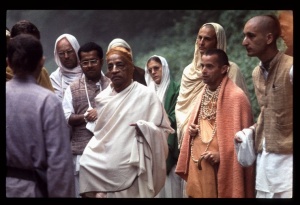SB 7.4.33

A.C. Bhaktivedanta Swami Prabhupada
TEXT 33
- nodvigna-citto vyasaneṣu niḥspṛhaḥ
- śruteṣu dṛṣṭeṣu guṇeṣv avastu-dṛk
- dāntendriya-prāṇa-śarīra-dhīḥ sadā
- praśānta-kāmo rahitāsuro 'suraḥ
SYNONYMS
na — not; udvigna — agitated; cittaḥ — whose consciousness; vyasaneṣu — in dangerous conditions; niḥspṛhaḥ — without desire; śruteṣu — in things heard of (especially elevation to heavenly planets because of pious activities); dṛṣṭeṣu — as well as in temporal things seen; guṇeṣu — the objects of sense gratification under the modes of material nature; avastu-dṛk — seeing as if insubstantial; dānta — controlling; indriya — the senses; prāṇa — the living force; śarīra — the body; dhīḥ — and intelligence; sadā — always; praśānta — quieted; kāmaḥ — whose material desires; rahita — completely devoid of; asuraḥ — demoniac nature; asuraḥ — although born in a demoniac family.
TRANSLATION
Although Prahlāda Mahārāja was born in a family of asuras, he himself was not an asura but a great devotee of Lord Viṣṇu. Unlike the other asuras, he was never envious of Vaiṣṇavas. He was not agitated when put into danger, and he was neither directly nor indirectly interested in the fruitive activities described in the Vedas. Indeed, he considered everything material to be useless, and therefore he was completely devoid of material desires. He always controlled his senses and life air, and being of steady intelligence and determination, he subdued all lusty desires.
PURPORT
From this verse we discover that a man is not qualified or disqualified simply by birth. Prahlāda Mahārāja was an asura by birth, yet he possessed all the qualities of a perfect brāhmaṇa (brahmaṇyaḥ śīla-sampannaḥ). Anyone can become a fully qualified brāhmaṇa under the direction of a spiritual master. Prahlāda Mahārāja provided a vivid example of how to think of the spiritual master and accept his directions calmly.